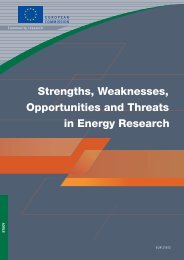Danish Strategy for Hydrogen and Fuel Cells - HY-CO Home
Danish Strategy for Hydrogen and Fuel Cells - HY-CO Home
Danish Strategy for Hydrogen and Fuel Cells - HY-CO Home
You also want an ePaper? Increase the reach of your titles
YUMPU automatically turns print PDFs into web optimized ePapers that Google loves.
Table 3. Efficiency ratio <strong>for</strong> different types of engines in the transport sector 10<br />
Petrol<br />
engine<br />
Diesel<br />
engine<br />
<strong>Hydrogen</strong>,<br />
combustion<br />
engine<br />
<strong>Hydrogen</strong>,<br />
fuel cell<br />
Current 17 % 22 % 18 % 38 %<br />
Potential<br />
2015<br />
20 % 25 % 23 % 42 %<br />
Hybrid *<br />
potential<br />
2015<br />
25 % 33 % 28 % 48 %<br />
* Hybrid = energy-saving combination using e.g. battery, flywheel, compressed air<br />
Systems analyses, etc.<br />
The energy sector traditionally makes use of socio-economic analyses including<br />
energy systems analyses. There is a need, especially in the field of new energy<br />
technologies, such as hydrogen <strong>and</strong> fuel cells, <strong>for</strong> knowledge of the economic,<br />
political, social <strong>and</strong> environmental consequences as well as the safety aspects of<br />
various development alternatives.<br />
The analyses comprise: various sorts of<br />
energy systems analyses (static or dynamic<br />
modelling, input data generated through<br />
projection or <strong>for</strong>esights or a combination of<br />
the two), life cycle analyses (total costs <strong>and</strong><br />
environmental loads from hydrogen<br />
production) as well as policy analyses <strong>and</strong><br />
evaluations of various aspects of the<br />
There are many players with<br />
competencies in systems analyses<br />
<strong>and</strong> other socio-economic analyses,<br />
such as RUC, Risø National<br />
Laboratory, Energinet.dk, <strong>Danish</strong><br />
Transport Research, AKF <strong>and</strong><br />
several consultancy firms.<br />
development <strong>and</strong> marketing of new energy technologies including the importance<br />
of st<strong>and</strong>ardisation, patenting <strong>and</strong> IPR. Analyses of potentially undesirable<br />
climatic effects of hydrogen use on the upper layers of the atmosphere would also<br />
be considered.<br />
The use of hydrogen-driven vehicles presents many safety aspects that need to be<br />
investigated be<strong>for</strong>e they can be introduced. It may be necessary to conduct<br />
destructive tests (collisions) to gain experience with high-pressure hydrogen.<br />
10 “ Strategic Research Agenda”. Report, 2004 The European <strong>Hydrogen</strong> <strong>and</strong> <strong>Fuel</strong> Cell<br />
Technology Plat<strong>for</strong>m.<br />
16




